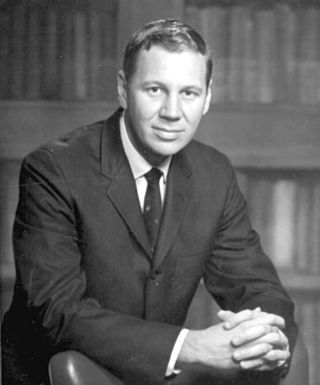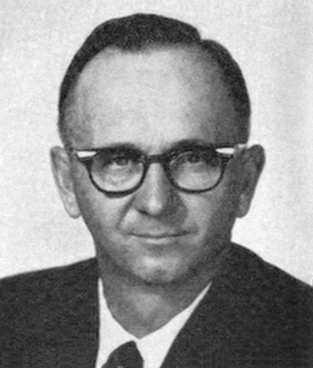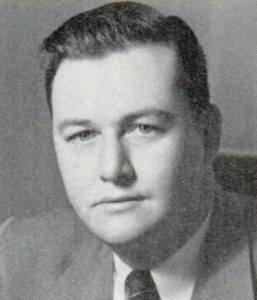
John William Snow is an American economist, attorney, and businessman who is the former CEO of CSX Corporation and served as the 73rd United States secretary of the treasury under U.S. President George W. Bush. He replaced Secretary Paul H. O'Neill on February 3, 2003 and was succeeded by Henry Paulson on July 3, 2006. Snow submitted a letter of resignation on May 30, 2006, effective "after an orderly transition period for my successor." Snow announced on June 29, 2006 that he had completed his last day on the job; Robert M. Kimmitt served as acting secretary until Paulson was sworn in. Snow has since worked as chairman of Cerberus Capital Management.

John Anthony Volpe was an American businessman, diplomat, and politician from Massachusetts. A son of Italian immigrants, he founded and owned a large construction firm. Politically, he was a Republican in increasingly Democratic Massachusetts, serving as its 61st and 63rd Governor from 1961 to 1963 and 1965 to 1969, as the United States Secretary of Transportation from 1969 to 1973, and as the United States Ambassador to Italy from 1973 to 1977. As Secretary of Transportation, Volpe was an important figure in the development of the Interstate Highway System at the federal level.

Joseph Walker Barr was an American businessman and politician from Indiana. He served one term in the United States House of Representatives. He was also the United States Secretary of the Treasury from December 21, 1968 until January 20, 1969, in President Lyndon B. Johnson's cabinet. He was a member of the Democratic Party.

Karl Earl Mundt was an American educator and a Republican member of the United States Congress, representing South Dakota in the United States House of Representatives (1939–1948) and in the United States Senate (1948–1973).

The 1968 United States Senate elections were elections for the United States Senate. Held on November 5, the 34 seats of Class 3 were contested in regular elections. They coincided with the presidential election of the same year. The Republicans picked up five net seats in the Senate. This saw Republicans win a Senate seat in Florida for the first time since Reconstruction.

The 1964 United States Senate elections were held on November 3. The 33 seats of Class 1 were contested in regular elections. Special elections were also held to fill vacancies. They coincided with the election of President Lyndon B. Johnson by an overwhelming majority, to a full term. His Democratic Party picked up a net two seats from the Republicans. As of 2023, this was the last time either party has had a two-thirds majority in the Senate, which allowed the Senate Democrats to override a veto, propose constitutional amendments, or convict and expel certain officials without any votes from Senate Republicans. However, internal divisions would have prevented the Democrats from having done so. The Senate election cycle coincided with Democratic gains in the House in the same year.

Quentin Northrup Burdick was an American lawyer and politician. A member of the North Dakota Democratic-NPL Party, he represented North Dakota in the U.S. House of Representatives (1959–1960) and the U.S. Senate (1960–1992). At the time of his death, he was the third longest-serving senator among current members of the Senate.

Arthur Albert Link was an American politician and farmer of the North Dakota Democratic Party, and later the Democratic-NPL. He served as a U.S. Representative from 1971 to 1973 and as the 27th Governor of North Dakota from 1973 to 1981.

Milton Ruben Young was an American politician, most notable for representing North Dakota in the United States Senate from 1945 until 1981. At the time of his retirement, he was the most senior Republican in the Senate, and the last member of the Lost Generation to serve in the Senate.
Wayne Godfrey Sanstead served as the North Dakota Superintendent of Public Instruction from 1985 to January 1, 2013, and from 1972 to 1981 as the 31st Lieutenant Governor of North Dakota.

The Vermont Senate is the upper house of the Vermont General Assembly, the state legislature of the U.S. state of Vermont. The senate consists of 30 members elected from multi-member districts. Each senator represents at least 20,300 citizens. Senators are elected to two-year terms and there is no limit to the number of terms that a senator may serve.

Louis Frey Jr. was an American lawyer and politician who served as a Republican member of the United States House of Representatives from 1969 until 1979. He represented Florida's 5th congressional district from 1969 to 1973 and the 9th district from 1973 to 1979, until he ran unsuccessfully in 1978 for the Republican nomination for governor to succeed the term-limited Democrat Reubin Askew of Pensacola.

Rolland William Redlin was a U.S. Representative from North Dakota, who served between 1965 and 1967. He also served in the North Dakota Senate from 1959 to 1963 and later returned to serve again from 1973 until his retirement in 2000, as Senate President Pro Tempore 1987–9, and Minority Leadership later during his final 27 years' service. A member of the Democratic-NPL, he lived near Minot, North Dakota until 2009, when he moved to Rapid City, SD, to be closer to family members.

Armistead Inge Selden Jr. was a segregationist U.S. Representative from Alabama.
Frank A. Wenstrom was a North Dakota Republican Party politician who served as the 28th Lieutenant Governor of North Dakota under Governor William L. Guy. Wenstrom also served in the North Dakota Senate for District 1 from 1957 to 1960 and 1967 to 1986, and was the President of the state's second Constitutional Convention.
Sidney Lewis Jones is an American economist and former official in the United States federal government. Educated at Utah State University and Stanford University, he initially taught in universities until he was recruited to join the staff of the Council of Economic Advisers. From there he held a number of positions in and out of government, including senior roles in the Departments of Commerce and the Treasury. A Republican, he has held strong views during his career about controlling inflation and federal government spending but was nonetheless well regarded as an economist across the political spectrum.













